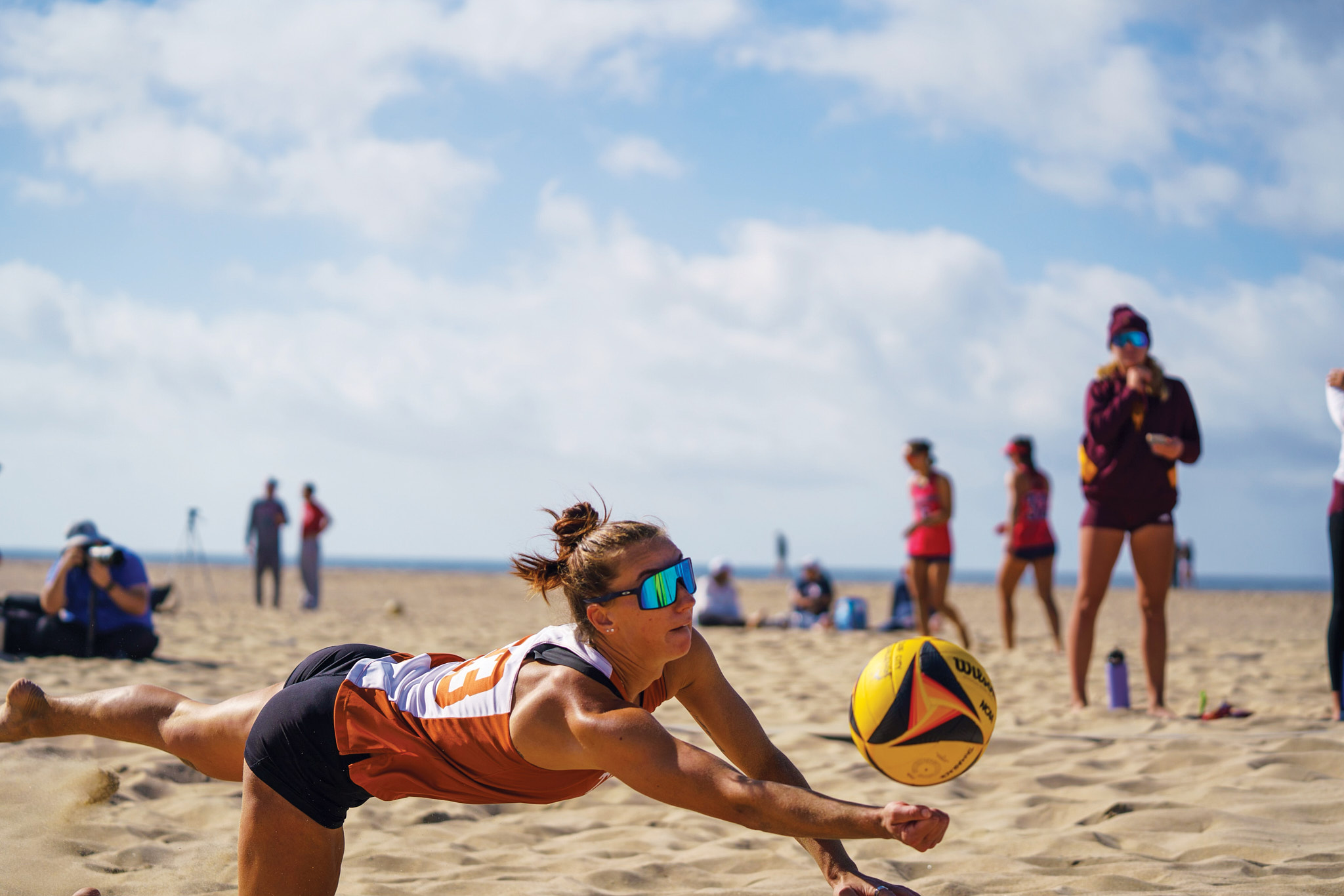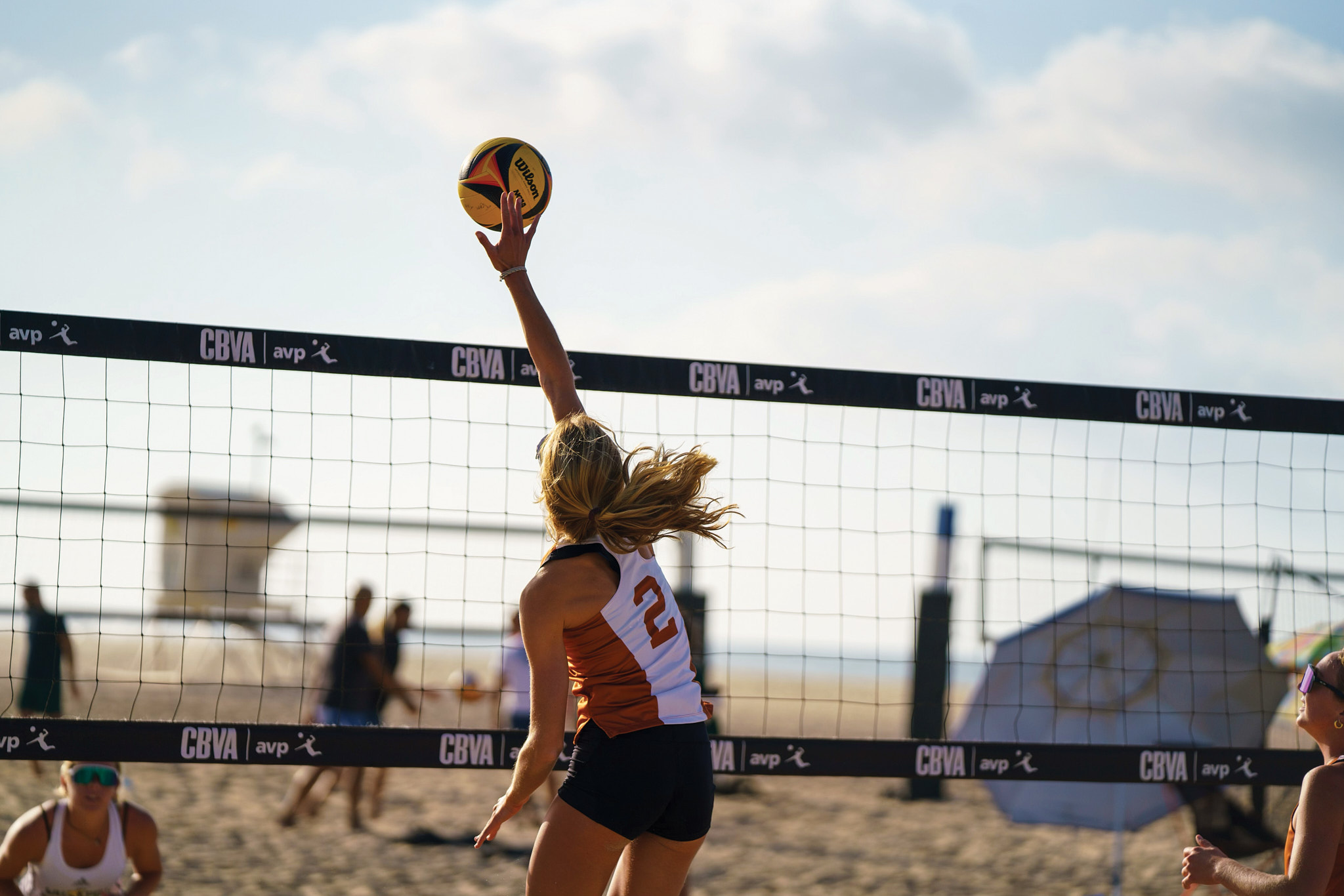Beach Volleyball is the Next Frontier of UT's Athletic Power
"Texas is a volleyball school.”
“Texas is a volleyball school.”
No, that’s not an echo you’re hearing. Rather, Jerritt Elliott’s reigning (and repeat!) NCAA Women’s Volleyball champions are not the only team on campus anymore. With the addition of women’s beach volleyball as the University’s 21st Division I sport, Texas is a volleyball school two times over. Beach Volleyball had what you might call a soft open in 2023, with assistant coaches and players from the indoor team playing outdoors on a shortened schedule. This year, things got real, with a roster of mostly beach-specific transfers under new head coach Stein Metzger.

It may be Metzger’s first year on the Forty Acres, but he was already someone at the top of his profession. A former indoor All-American and three-time national champion player for UCLA in the ’90s, Metzger went on to both professional beach volleyball and the 2004 United States Olympic team before starting UCLA’s beach program in 2013. His Bruins won NCAA titles in 2018 and 2019, while also falling just short both in 2021 and 2023.
“He had the pedigree, but also the personality that we wanted—to treat kids the right way, and go about it the right way,” says Elliott, who in addition to his indoor coaching duties now carries the title of director of volleyball operations. “We hit a home run with him.”
(Don’t you mean an ace or kill, coach?)
Beach is played in teams of two, with five best-of-three “duals” making up a match. That’s very different from the six-position indoor me, where the players have more specialized roles. The indoor team has always played a little beach for fun and skill development. But playing it competitively, even for such stars as Madisen Skinner and Asjia O’Neal, BS ’21, MEd ’22, turned out to be a taller order. UT’s provisional squad went just 1-12 in 2023.
“It just points to how different the games are,” Metzger says. “When you play indoor, you get to choose which skill you’re going to perform. Your hitters are going to hit. Your blockers are gonna block. On the beach, it’s your opponent who decides what you’re going to do ... It makes for totally different kinds of athletes. You have to be a jack of all trades.”
“It’s like trying to play tennis versus badminton,” Elliott says. “You couldn’t take a player and be successful in both of them. It takes a little time to learn.”
There are also minor rule differences. But the biggest difference is the sand surface (which also varies depending on whether you are playing at an actual beach or some place like the Wright-Whitaker Sports Complex) and wind. Teams switch sides every seven points so that one team doesn’t have an advantage (on the so-called “good side”). And at any given tournament, the morning wind might not be the same as the afternoon wind. “So you need to be able to change how you play the game,” Metzger says, “within a day, sometimes even within a match.”
For Metzger, the chance to build another powerhouse program at a place like Texas was a no-brainer. He’s originally from Hawaii, not California, and his two kids (daughter, Quinn, 13, and son, Otto, 11) were just young enough for this to be the right time for he and his wife, Emily, to make a move. And Texas already had a booming juniors (i.e. high school age) beach volleyball scene, second only to California and Florida, amid an overall boom at the collegiate level. There were only 15 Division I beach programs in 2012. Today, there are more than 100.
“Texas in the last few years has been the growth market for recruiting,” Metzger says. “And Texans love going to Texas. They all understand the power of [the University] and the education, and obviously the strength of the athletics. So I thought that this could be the next big coming in terms of a dominant team across the nation.”
Ten of the 12 beach-only players on the 2024 roster are from Texas, with six from Austin, including Katie Hashman and Macie Butler (who transferred from UCLA), Chloe Charles (who made the Final Four with Florida State in 2023) and sisters Ava and Carys Patton, the daughters of former Longhorns defensive great James Patton, BBA ’02, MBA ’07, Life Member.
Ava was a soccer player and Carys an indoor volleyball player when they caught the beach bug (one of Carys’s teammates had a backyard court) and switched their focus to the world of junior clubs and tournaments. But being good enough to play collegiately meant they couldn’t go to the University they grew up dreaming of attending.
“We’d come to the football games,” Ava Patton says. “And we were like, This is so depressing. We can’t go here!”

Wanting to at least stay close to home in Texas, she enrolled at TCU, where, as a redshirt freshman, she sometimes had to remember not to wear burnt orange.
The Horned Frogs were the No. 1 team in the country last year before losing to eventual champion USC in the Final Four. But once UT announced they’d hired Metzger and begun recruiting, “I was like, I have to be there. I called my coaches and [said] ‘Hi, sorry. I want to leave.’ And then I went in the transfer portal.” (Carys Patton, who is a year younger, had also been originally committed to TCU .)
Even this 2024 season, which ended on April 13, was basically transitional. (As this issue of the Alcalde went to press in early April, the team, with seven full-time players, five redshirts, and a sprinkling from the indoor roster, was 5-5 with six games remaining.) By the time Metzger’s first full recruiting class (and, inevitably, more transfers) arrives for 2025, he’ll have a full roster, a fully integrated system and a culture. The intention—as with all programs at Texas—is to have the best of everything, from facilities to social media to staff. One of Metzger’s assistants, Angie Akers, coached the U.S. to an Olympic Gold medal at Tokyo in 2021, while the other, David Buchanan, founded the Plano-based national juniors power Madsand.
And on top of that, the plan is to consistently compete for championships, and sooner—i.e., next season—than later. Ava Patton, for one, feels they have the coaching, drive, and mental toughness to do it.
“A lot of people probably doubted all of us when we came here,” she says. “Like, ‘What are they thinking? It’s brand new. Why would they leave a really good school to do this? They’re not going to be good fast.’ But I really think we are.”
CREDITS: Texas Athletics





